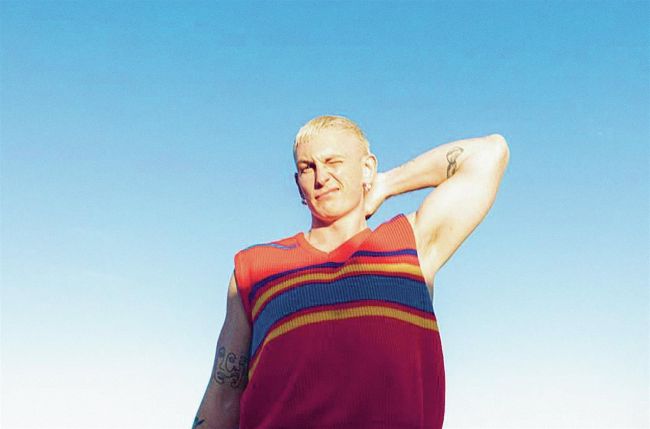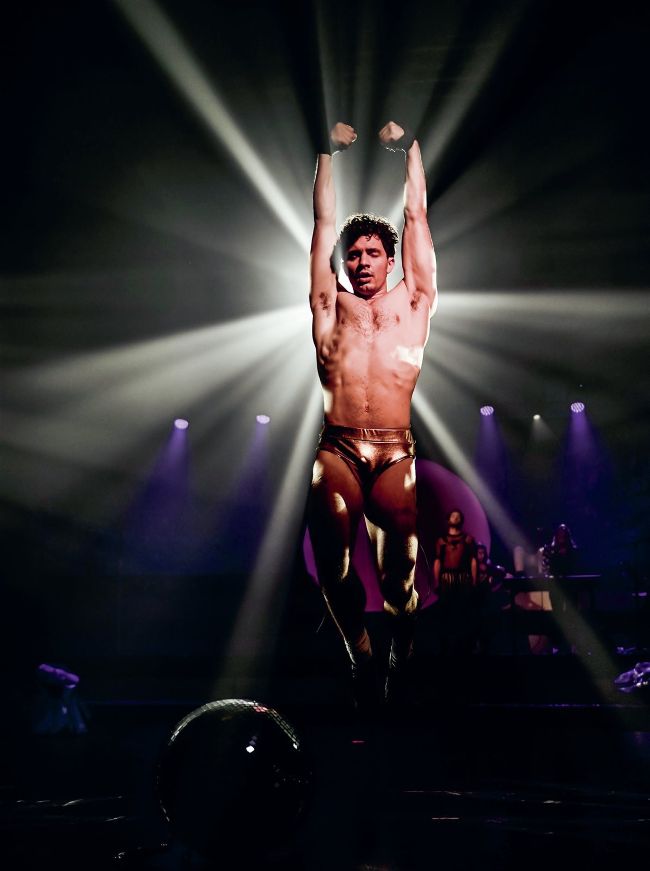BEHIND THE GURTAIN
Theatre has been associated with queerness for centuries, from traditions of onstage gender play to the many legions of queer theatre creatives and fans. They don’t call us “drama queens” for nothing. Damian Kerlin speaks to artists working in theatre in Ireland today and explores how we’ve come to tell our stories on stage.

In the first half of the 20th century, you could be arrested for staging a gay play. Theatres could be packed and shows sold out, but that wouldn’t stop them from being shut down for “obscene” content. Yet Ireland has always been a hot bed of queer artistic activity, from the infamous visit of theatre company Gay Sweatshop in 1976 (described by one paper as “gutter culture from across the water”) to the production of Gerry Stembridge’s The Gay Detective in 1996. The latter was of particular importance as it proved that the Irish public was not apathetic to gay work- as claimed by director Patrick Mason when his own production of Angels in America died a death at the Abbey.
“There were a lot of playwrights who dealt with homosexual themes prior to this in very subtle ways,” says Dr Fintan Walsh, whose book Queer Notions acts as an anthology reflecting the past decade of queer theatre. “Frank McGuiness’ work in particular pivots on a queer dramaturgy. His plays often had homosexual characters, which he used to explore lots of other categories of difference. Of nationality, sectarian politics, history.”
Critics often failed to pick up on these themes and on occasion objected to them, as figurations of queer sexuality worked to unsettle the theatrical cannon, shaped by the Catholic, nationalist environment of its conception. “A development in Irish theatre and its journey from being literary-based to performance-based, as well as the emergence of the gay-rights movement, is what paved the way for what we have today,” says Walsh.
And, what a selection we have! We may still be playing catch up, and LGBTQ+ theatre in Ireland is still a predominantly cis, white, male game, but that doesn’t mean we aren’t making strides in the right direction.
The International Dublin Gay Theatre Festival celebrates its 20th anniversary this year and is known for its ambitious programming covering everything from gender identity to darker themes like domestic violence and abuse. “The stage is ours; it is an opportunity to bring to life, what words often fail. The aim of our programme isn’t to shock, it is to tell the real stories, both nationally and internationally, of our LGBTQ+ community,” Artistic Director, Brian Merriman, told me.
Today more LGBTQ+ people can share their truth through theatre and the arts, which acknowledges and values their complete identity and citizenship. The times have changed and the more we pursue our intercultural dialogue through theatre as an art form, the more we liberate art and the diverse society in which it is presented and appreciated.
PJ Kirby, one half of the podcast duo I’m Grand Mam, is about to embark on an international tour of his one man show Cliché after a sold-out run at Smock Alley Theatre. He shared his thoughts on his own addition to the queer theatre scene - “Cliché reflects what I believe my life in my 20’s to have been. It covers all the big traumatic life lessons, which I’ve overcome, the three big clichés of a queer millennial - working class boy from small town, who goes on to ‘make’ something of himself, my craving for external validation, and my body dysmorphia. I say its predictable, because there is nothing new, as these stories have been told before, but it’s how I’ve overcome them, which is what I believe has made the show the success it is, as audiences can relate. It is not a million miles away from their own experience.”
How we tell our own stories has always been different to how those from the outside perceive them. Having spent so long on the fringes, we now own them, and in the case of THISISPOPBABY, we are using our spaces, in particular queer clubbing, to bring them to the forefront.
THISISPOPBABY originated when a collective of artists met at Dublin Fringe Festival in 2006. Fast forward to January 2007 and the company was formed, staging their first play Danny and Chantelle (Still Here). “We’ve always challenged the norm when it comes to theatre, both what’s performed and where,” said THISISPOPBABY’s Phillip McMahon.

WAKE
- Ruth Medjber
15 years on, Phillip puts their success down to two things; “The spirit of the company and the family which we have grown. When we set up Poptopia at Electric Picnic (Music and Arts Festival), we were tasked to programme three 14-hour days of sheer queer celebration and culture. When you create something as euphoric as that, people remember, so when you perform in theatre, they come on the journey with you.”
This was evident when their seminal musical Alice In Funderland premiered at The Abbey Theatre in 2012, wowing audiences and bringing a 56 percent new attendance rate to the national theatre.
All that discussion we’ve had aside, just what do we mean when we say ‘queer’ theatre? Well, once a derogatory slur, it’s now an umbrella term reclaimed by the LGBTQ+ community and - for the purposes of this article - means someone who is not heterosexual and/or does not conform to the established ideas of sexuality and gender.
Brian Merriman told me, “It’s important we keep focus on our identity and not on our behaviour. Identity is who we are, but our behaviour can be transient, and it’s important that when using umbrella terms like ‘queer’, we don’t forget the impact of our shared heritage which has formed our identity.”
“The term ‘queer’ refers to all the gorgeous weirdos who make it. I don’t think there is a line and if there is, it’s certainly not for me to say so. The LGBTQ+ acronym and its terms are for people to use at any given time for what they need” Phillip McMahon continues. “However, we do run the risk of diluting our history. My works exists through a queer lens. It is explicitly queer, and I feel that I am not only able to tell my story but the stories of others because I’ve done the work. I’ve researched our history, which has informed my practice.”
There is not one singular queer experience or narrative. There are certainly commonalities in experiences, but we do a disservice to the complexity of LGBTQ+ stories by conflating everything. Part of the beauty of the queer or LGBTQ+ community lies in its diversity and its rejection of heteronormativity. Queerness exists in all mediums: in drag, dance, burlesque, circus, cabaret etc, and we are seeing these lines blurred more and more often with new shows incorporating aspects of all disciplines.
And long may it continue Beyond these depictions of the fullness of life for queer characters onstage, we need to see a much wider range of characters, period. Many in the queer community reinforce the gender binary just as hard as their peers in the straight world. Yes, it was seismic when stages first began to depict stories of gay men and then lesbians, but your average 18 year-old now knows how many other identities fill out the rainbow. They want to see trans, non-binary and other gender non-conforming characters onstage. They want to see bisexual and pansexual characters, characters who transcend the alloromantic model entirely, and those whose romantic and sexual practices may not align with any single identity. Our stories are often bold, but they can also be nuanced and, much like our community, they change and evolve. There are no rules.
Talking about THISISPOPBABY’s previous show, WAKE, which premiered as part of Dublin Fringe Festival in 2022, McMahon explains, “WAKE is a life of its own, where club culture meets Irish tradition and it plays on what queer clubbing means to the LGBTQ+ community and the journeys we go on, and how they differ depending on how we identify in these spaces.
“But then If These Wigs Could Talk with Panti Bliss, is a one-person show, which is much more personal and is a long-standing relationship which depicts the different stages of her life, since we first staged In These Shoes together in 2007. It’s all about balance.”
It is incredible to be able to look back at queer theatre in Ireland and witness it become so deeply embedded in theatre programming that audiences come to expect it, love it and even demand it. It is beginning to feature an array of rounded characters, spanning the wide spectrum of orientations and gender identities, their stories told in modes unfettered by past expectations of genre and tone and structure. Long may it continue.